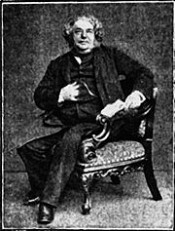Lemon Mark

Mark Lemon (London, 30 November 1809 – Crawley, 23 May 1870) was founding editor of both Punch and The Field. Born in London, England, he was the son of Martin Lemon, a hop merchant, and Alice Collis. His parents married on 26 December 1808 at St Mary, Marylebone, London. His father having died in 1817, Lemon was just 15 when he was sent to live in Boston,Lincolnshire with his mother's brother Thomas Collis. Mark had a natural talent for journalism and the stage, and, at twenty-six, retired from less congenial business to devote himself to the writing of plays. More than sixty of his melodramas, operettas and comedies were produced in London, whilst at the same time he was contributing to a wide variety of magazines and newspapers. He married Helen (Nelly) Romer, on 28th September 1839 in Kensington, London and had 8 children - sons Mark, Frank and Henry, and daughters Alice, Betty, Helen, Mary and Kate. Frank died shortly after he was born. In 1841 Lemon and Henry Mayhew conceived the idea of a humorous weekly paper to be called Punch, and when the first number was issued, in July 1841, were joint-editors and, with the printer and engraver, equal owners. The paper was for some time unsuccessful, Lemon keeping it alive out of the profits of his plays. On the sale of Punch, Lemon became sole editor for the new proprietors. It remained under his control until his death, achieving remarkable popularity and influence. Two other long-running magazines in which Lemon played a significant part were the Illustrated London News, the first publication to make use of pictures as well as text in reporting, which was founded by his friend Herbert Ingram, and The Field, of which he was founder editor (1853-1857). Lemon was an actor of ability, a pleasing lecturer and a successful impersonator of Shakespearian characters. He also wrote a host of novelettes and lyrics, over a hundred songs, a few three-volume novels, several Christmas fairy tales and a volume of jests. He was a stalwart of the London Gentlemen's club the Savage Club. He died in his adopted home town Crawley, West Sussex on 23 May 1870 and was buried in St Margaret's Church, Ifield.
do you like this author?
What readers are saying
What do you think? Write your own comment on this book!
write a commentWhat readers are saying
What do you think? Write your own comment on this author!
write a commentBook list

The Jest BookThe Choicest Anecdotes and Sayings
Series:
Unknown
Year:
Unknown
Raiting:
4/5
Show more
add to favoritesadd In favorites

The Jest Book
Series:
Unknown
Year:
Unknown
Raiting:
3/5
This scarce antiquarian book is included in our special Legacy Reprint Series. In the interest of creating a more extensive selection of rare historical book reprints, we have chosen to reproduce this title even though it may possibly have occasional imperfections such as missing and blurred pages, missing text, poor pictures, markings, dark backgrounds and other reproduction issues beyond our control. Because this work is culturally important, we have made it available as a part of our commitment to protecting, preserving and promoting the world's literature. --This text refers to the Paperback edition.
Show more
add to favoritesadd In favorites
Book list

The Jest BookThe Choicest Anecdotes and Sayings
Series:
Unknown
Year:
Unknown
Raiting:
4/5
Show more
add to favoritesadd In favorites

The Jest Book
Series:
Unknown
Year:
Unknown
Raiting:
3/5
This scarce antiquarian book is included in our special Legacy Reprint Series. In the interest of creating a more extensive selection of rare historical book reprints, we have chosen to reproduce this title even though it may possibly have occasional imperfections such as missing and blurred pages, missing text, poor pictures, markings, dark backgrounds and other reproduction issues beyond our control. Because this work is culturally important, we have made it available as a part of our commitment to protecting, preserving and promoting the world's literature. --This text refers to the Paperback edition.
Show more
add to favoritesadd In favorites
What readers are saying
What do you think? Write your own comment on this author!
write a commentif you like Lemon Mark try:
readers also enjoyed
What readers are saying
What do you think? Write your own comment on this author!
write a commentif you like Lemon Mark try:
readers also enjoyed
Do you want to exchange books? It’s EASY!
Get registered and find other users who want to give their favourite books to good hands!

